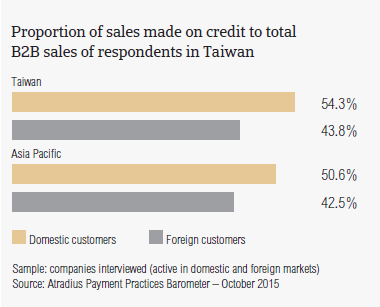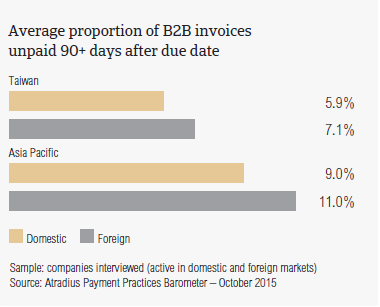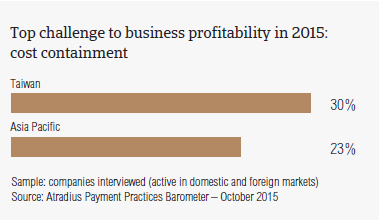32.5% of respondents in Taiwan compared to 25.8% in Asia Pacific said that domestic B2B customers pay invoices late most often due to disputes over the quality of goods delivered or services provided.
Survey results for Taiwan
Sales on credit terms
Respondents in Taiwan seem to use trade credit in B2B transactions more often than their peers in Asia Pacific do. 95% of respondents in the country, compared to 91% in Asia Pacific, reported having granted trade credit to their B2B customers over the past year. In particular, 25.7% of respondents in the country (compared to 15% in the region) showed a completely trade credit friendly stance and made all of their B2B sales on credit.
54.3% of the total value of domestic B2B sales are made on credit. This figure is higher than the 50.6% average for Asia Pacific, and is the second highest in the region, after that observed in Japan. 43.8% of the total value of the B2B export sales of respondents are made on credit. The average for Asia Pacific is 42.5%.

The above findings indicate that respondents in Taiwan do perceive the payment default risks arising from domestic B2B trade to be less than those from foreign B2B trade; a perception which is consistent with the regional pattern. Granting B2B trade credit more frequently on the familiar domestic markets and more selectively on export markets is surprising for economies as Taiwan’s, whose GDP growth is heavily dependent on exports.
In 2014, the average proportion of domestic and foreign B2B sales made on credit by respondents in Taiwan registered an increase both of 6 percentage points. This is higher than the average increases in domestic and foreign credit-based B2B sales recorded in Asia Pacific over the same time frame (3.5 and 5.5 percentage points respectively).
These variations have to be read in light of the current slowdown in Taiwan’s economy. Recent data suggests that growth holds steady, and exports have been contracting chiefly due to weak demand from China.
Average payment term
Domestic B2B customers of respondents in Taiwan are extended an average of 41 days from the invoice date to pay invoices (above the 33 days survey average). This is the second longest term in Asia Pacific, after that recorded in Japan (47 days).
Slightly less time to pay invoices (37 days on average) is given by Taiwanese respondents to their B2B customers abroad. This average payment term is four days longer than the average for Asia Pacific, and it is the same as that recorded in Hong Kong.
Over the past two years, the average invoice payment terms given to B2B customers domestically did not change notably. Conversely, the average term extended to customers abroad decreased steadily.
Overdue B2B invoices
Respondents in Taiwan appear to have experienced late payment of invoices slightly less often than their peers in Asia Pacific. More specifically, 87.9% of respondents in the country compared to 90.2% of respondents in the region experienced late payment of invoices by their domestic and foreign B2B customers over the past year. This is the second lowest response rate in the region, after that of Japan.
Late payment from domestic B2B customers was experienced more frequently than from customers abroad. This corresponds to an average of 44.4% of the total value of domestic, and 41.8% of the total value of foreign B2B invoices which remained unpaid at the due date. In particular, the foreign late payment rate in Taiwan is lower than the regional averages (44.8% domestic and 45.2% foreign). Compared to the above mentioned frequency of late payment, these findings suggest that, in Taiwan, late payment by B2B customers on invoices of high amounts occurs more often than it does in Asia Pacific.
Invoices which remained unpaid 90 days or longer average 7.5% of the total value of domestic, and nearly 10% of the total value of foreign B2B invoices (averages for Asia Pacific: 8.8% domestic and 11% foreign). These very long outstanding receivables are likely to turn into bad debts and write-offs.

An indication that some of the domestic and foreign B2B customers of respondents in Taiwan do not pay invoices in a timely manner is provided by the Days Sales Outstanding (DSO) figure recorded in the country. This averages 40 days (five days above the 35 days regional average), and is the same as that recorded in Japan and Singapore.
This finding suggests that businesses interviewed in Taiwan, and those in countries with a DSO longer than the regional average, tend to have more outstanding receivables of greater value which are paid slowly by customers.
As these invoices may potentially remain outstanding for a longer time, they are likely to be defaulted on. This could expose businesses in the above mentioned countries to the risk of customers’ payment default, more than businesses in other Asia Pacific countries are.
Average payment delay
Domestic and foreign B2B customers of respondents in Taiwan pay overdue invoices, on average, 21 days after the due date. This is below the regional averages (25 days domestic and 28 days foreign). Considering the average term for invoice payment granted by respondents in Taiwan, we notice that payment on domestic B2B overdue invoices is received, on average, around 62 days after invoicing, and on foreign invoices after about 58 days from the invoice date.
In 2015, both the average domestic and foreign payment delay figures in Taiwan decreased, whereas the average total value of invoices remained unchanged. This trend is reflected in the DSO figure observed in Taiwan, which is higher than the regional average. B2B customers of respondents in Taiwan appeared to delay payments for a number of different reasons, which will be commented on further in this report (see below ‘Key payment delay factors’).
Late payments of invoices are likely to have a negative impact on the company’s cash flow and profitability. This is due to the financial and administrative costs brought by overdue accounts. This may explain why most of the respondents in Taiwan (30.1%, versus 23.0% in Asia Pacific) consider cost containment to be one of the biggest challenges to business profitability this year. This is in line with the survey pattern.
Above the regional response rate is also the percentage of respondents (nearly 22%, versus 19.3% for Asia Pacific) who consider maintaining adequate cash flow to be the biggest challenge to profitability in 2015. This opinion likely reflects the uneven growth trend the country is currently facing.
Key payment delay factors
The largest percentage of respondents in Taiwan (45.9%) said that domestic B2B customers paid invoices late mainly because of liquidity issues. This is consistent with the 46.3% of respondents in Asia Pacific who voiced the same opinion. Notably more respondents in Taiwan than in Asia Pacific (32.5% versus 25.8%) said that late payment of domestic B2B invoices is most often due to disputes over the quality of goods delivered or services provided. Interestingly, around 30% of respondents in the country (versus 28.6% in the region) said that domestic B2B invoices are paid late due to the complexity of the payment procedure.
The complexity of the payment procedure was also the second most often cited reason for late payments from foreign B2B customers (32.3% of respondents in Taiwan, versus 39.4% in the region). The main delay factor cited by customers abroad is the non-correspondence of goods delivered or services provided to the agreed contractual terms (nearly 38% of respondents, versus 25.4% in Asia Pacific). Liquidity issues is the third most frequent reason for slow payment among customers abroad (cited by nearly 31% of respondents, versus 34.5% in the region).
Uncollectable accounts
2.2% of the average total value of B2B receivables in Taiwan was written off by respondents as uncollectable. This is slightly above the 2.0% regional average. Consistent with the survey pattern, domestic write-offs outweigh foreign ones.
Domestic and foreign uncollectable B2B receivables were reported to stem primarily from the chemicals, consumer durables, electronics, and services (business, financial and services in general) sectors.
For most of the respondents in Taiwan (59.3%), domestic and foreign B2B receivables were written off as uncollectable because the customer went bankrupt or out of business. This compares to 54.4% of respondents in Asia Pacific. For around 37% of respondents in the country, B2B receivables went uncollected when the customer could no longer be located, or the debt was too old (35.5% and 32.6% of respondents in Asia Pacific respectively).
To learn more about the B2B receivables collections practices in Taiwan, please see the Global Collections Review by Atradius Collections (free download after registration), available from 28 October 2015 on atradiuscollections.com

Payment practices by industry
Survey respondents in Taiwan reported having granted trade credit terms mainly to B2B customers belonging to the chemicals, consumer durables, electronics, food, metals, and services (financial, business and overall services) sectors. The most relaxed payment terms, averaging 50 days from the invoice date, were given to domestic and foreign B2B customers in the chemicals sector.
The highest levels of late payments were attributed to domestic and foreign B2B customers in the financial services sector. Around half of the total value of B2B invoices in this sector ended up in late payments, most often from foreign customers.
The insufficient availability of funds was the most often reported reason for late payment of domestic invoices in the chemicals and consumer durables sectors (around 70% of respondents alike). Late payment of foreign invoices because the goods delivered or services provided were inconsistent with what was agreed in the contract was most often reported as coming from the chemicals sector (44% of respondents).
54% of respondents in Taiwan said that they do not anticipate any change in the payment behaviour of domestic B2B customers over the coming 12 months. 30% anticipate a worsening, particularly in the chemicals and consumer durables sectors. 15% of respondents expect an improvement in payment behaviour of domestic customers, particularly in the financial services sector.
As to foreign B2B customers, 52% of respondents in Taiwan do not anticipate any significant variation in the payment behaviour over the coming 12 months. Nearly 30% expect a worsening, most likely in the services sector. An improvement in foreign payment behaviour, mainly in the electronics sector, is expected by nearly one in five respondents.
For more insights into the overall payment practices in each of the countries surveyed in Asia Pacific, please refer to the respective country reports which form, along with the regional report, the 2015 edition of the Atradius Payment Practices Barometer for Asia Pacific. Free download on atradius.com
Documenti collegati

1.03MB PDF

3.01MB PDF

34KB PDF

